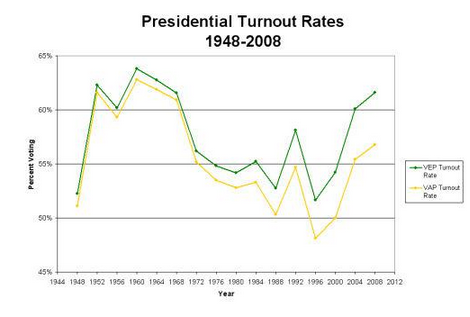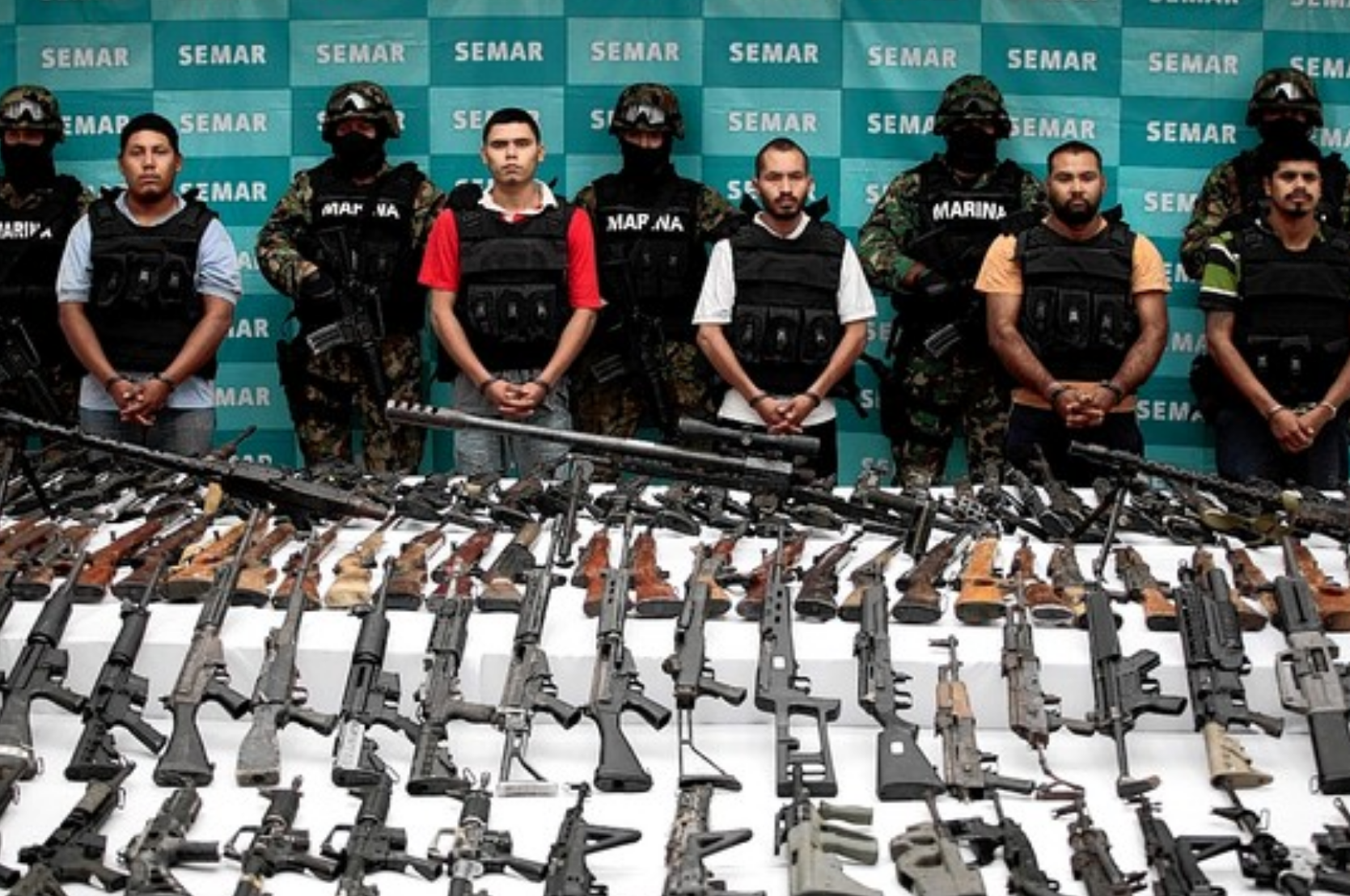In the 2012 presidential election, only 56.8% of the eligible voting population chose to cast a ballot. Despite an eight million eligible population increase, five millions less ballots were cast than four years ago. The numbers for non-presidential election years are even lower, with only 37.8% of the eligible population having participated in the 2010 congressional elections (Koyzis). This trend is nothing new; voter turnout in the United States is historically between forty-five and sixty-five percent, a much lower rate than most other developed democracies.
The attempt to delineate why so many Americans fail to show up to the polls has yielded a variety of explanations. Some argue that the combination of registration and voting procedures is too complicated and lengthy a process. The process varies by state, and deadlines range from in person registration a minimum of seven days before the election (Connecticut) to being postmarked by the fifth Monday before the election (Georgia). Approximately ten states and the District of Columbia currently allow same day registration (SDR) with an increasing number of states proposing similar legislation, whereas North Dakota is does not require voter registration at all (same day voter).
Programs that make the registration process less complicated are seen as a way to increase voter participation. A recent study by the Brennan Center for Justice suggests that this notion holds true. The report concludes that states with an SDR option see a higher turnout on election day than states that do not. Unsurprisingly, the top five states in terms of voter turnout all have SDR.
There are, of course, other suggestions for increasing participation, which include declaring Election Day to be a federal holiday, holding voting days on weekends, or increased access to early voting. Perhaps the most encompassing proposal is one that would require all eligible citizens to vote.
Compulsory voting exists in approximately thirty-one countries around the world, including many large democracies. Perhaps the most well known is Australia, which has required attendance at elections since 1924. Although voting itself is not required, all eligible citizens are obliged at minimum to check their name off at the election venue. Failure to do so results in fines ranging from AU$20-$AU50, and those who do not pay may face imprisonment. The Australian government does allow those that are sick or can provide a valid reason for nonattendance to defend themselves against paying the penalties.
The longest standing compulsory system comes from Belgium, where the practice has been enforced since 1892 for men and 1949 for women. The Belgian system is more severe than that of Australia. Four consecutive instances of nonparticipation may result in a ban from voting for the next ten years and difficulties securing employment in the public sector.
Many other countries use less formal sanctions that are intended to encourage voting participation. “Innocuous sanctions” in Italy result in non-voters names being posted at town halls, sometimes making it difficult to find childcare and receive public benefits. In Greece, those without paperwork proving they had voted may have trouble obtaining passports or driver’s licenses. The intent of these policies is to foster a sense of societal obligation towards voting and to increase participation.
Despite the reverence most Americans have for our democratic system, in a 2000 study conducted by the Institute for Democracy and Electoral Assistance (IDEA), the United States ranked 138th out of 172 countries in eligible voter participation. Our rhetoric is statistically at odds with our actions. With inevitably low turnouts looming, almost every election year sees a revival of whether or not the United States should consider compulsory voting.
The arguments for such a system are especially compelling in a time of extreme partisanship and little cooperation. William Galston of the Brookings Institution suggests that our low turnout rate contributes to extreme polarization. He reasons that “hard-core partisans are more likely to dominate lower-turnout elections, while those who are less fervent about specific issues and less attached to political organizations tend not to participate at levels proportional to their share of the electorate,” in a recent article published in the New York Times. More moderate leaning non-voters could temper the recent rise in political extremism by electing those with a stance that is more towards the middle of the spectrum. Proponents of creating a compulsory voting system also cite that it will make our government more democratic by truly representing the majority of citizens and could also reinforce the Kennedy-era ideology of duty to our country.
The proposal is not without critics, as many say that this would go against the deeply rooted sentiment of freedom held by most Americans. Furthermore, other political scientists argue that even if voting were mandatory, it would not change public policy outcomes as much as advocates suggest. Researchers at George Washington University studying the Gore-Bush election found that non-voters were mostly democratic learning, suggesting that compulsory voting would have called the election for Al Gore, but note that a complete policy shift to the left would not have been likely.
Simply put, if jury duty is required, then voting should be too. Jury duty is required to preserve the integrity of our judicial system, and perhaps voting should be required to uphold our legislative and executive branches as well.
Danielle Messler
Political Science ’13
“FACTBOX: Key facts about Belgium’s electoral system.” . Reuters, 10 2007. Web. 18 Dec 2012. <http://www.reuters.com/article/2007/06/10/us-belgium-election-system-idUSL1024618320070610>.
Friedman, Howard S.. “American voter turnout lower than other wealthy countries.” The Huffington Post. Web. 18 Dec 2012. <http://www.huffingtonpost.com/howard-steven-friedman/voter-turnout-europe-america_b_1660271.html>.
Galston, William. “Telling Americans to Vote, or Else.”The Sunday Review. The New York Times, 05 2011. Web. 18 Dec 2012. <http://www.nytimes.com/2011/11/06/opinion/sunday/telling-americans-to-vote-or-else.html?adxnnl=1&pagewanted=all&adxnnlx=1349802010-en4esPgpkCIQwWWNzgd74Q&_r=0>.
Gerber, Alan, Donald Green, and Christopher Larimer. “Social Pressure and Voter Turnout: Evidence from a Large- scale Field Experiment.” American Political Science Review, n.d. Web. 18 Dec 2012. <http://www.apsanet.org/imgtest/apsrfeb08gerberetal.pdf>.
“Glossary of Election Terms.” . ABC Elections. Web. 18 Dec 2012. <http://www.abc.net.au/elections/federal/2010/guide/glossary.htm>.
Koyzis, David. “Voter Turnout and Competitive Politics.” Public Justice Report. The Center for Public Justice. Web. 18 Dec 2012.
Lui, Eric. “Should Voting Be Mandatory?.” Time Ideas. Time Magazine, 21 2012. Web. 18 Dec 2012. <http://ideas.time.com/2012/08/21/should-voting-be-mandatory/>
Orsag, Peter. “Make Voting Mandatory.” Bloomberg View. Bloomberg, 19 2012. Web. 18 Dec 2012. <Make Voting Mandatory>.
Russell, Eric. “Same-day voter registration increases turnout, studies say.” BDN Politics. Bangor Daily News, 03 2011. Web. 18 Dec 2012. <http://bangordailynews.com/2011/10/03/politics/new-reports-support-same-day-voting-advocates-say/>.
Same day voter registration. National Conference of State Legislatures, 24 2012. Web. 18 Dec 2012. <http://www.ncsl.org/legislatures-elections/elections/same-day-registration.asp&xgt;.>.
Sides, John, Eric Schlickler, and Jack Citrin. “If Everyone Had Voted, Would Bubba and Dubya Have Won?.” Presidential Studies Quarterly. Web. 18 Dec 2012. <http://home.gwu.edu/~jsides/bubbadubya.pdf>.
Voter Registration Deadlines. Long Distance Voter, 11 November 2012. Web. 18 Dec 2012. <http://www.longdistancevoter.org/voter_registration_deadlines>.
Weiser, Wendy, and Lawrence Norden. “Voting law changes in 2012.” Brennan Center for Justice. Web. 18 Dec 2012.



